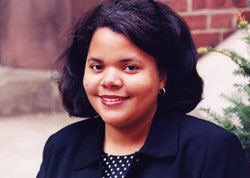Activism by the Numbers: Raising Math Consciousness in a Phobic Society
When Erica Walker was in high school, a teacher persuaded her to sign up for AP calculus during her senior year. Walker had always been good at math - but she'd never seen the subject as anything more than a requirement to fulfill.
The decision changed her life - though not quite as Hollywood might have scripted it.
"The calculus teacher was terrible," she says with a laugh. "So we students all taught each other after class."
Walker discovered that she enjoyed tutoring her friends. She went on to major in math in college and teach it in public school, and today she is Assistant Professor of Math Education at TC. But as every other black student but one dropped out of that high school calculus course, she came to another kind of realization as well.
"In this country, we think that if you're not born with math talent, forget it," she says. "That kind of math phobia crops up in every ethnic group, but it's worse for students of color because they're already victimized by cultural assumptions of lack of ability. The schools they attend are less likely to have good math resources and qualified teachers. Then their scores compound the problem."
In her research, Walker explores factors contributing to the math success of students of color throughout their schooling careers. Part of the solution, she believes, is to prepare better, more creative math teachers, who can adapt to the needs of different students and - even more importantly - make the subject interesting.
"We're asking our elementary school teachers to impart knowledge and excitement to kids, yet so many are math-phobic themselves," she says. "As a result, we're not identifying talented math kids early and giving them math-rich experiences."
In her work with prospective teachers, Walker's message is that "math is beautiful, elegant, fluid -there is no single way to solve a problem, but many different ways, each suited to a different kind of learner."
But her purpose is also to raise "math consciousness" among under-served groups.
"Bob Moses [1960s civil rights activist and creator of the Algebra Project] says, How do we get kids who go to school and learn only basic skills and no critical thinking to demand more math? It's analogous to voting rights for him. People had to be educated, not only about their rights but about what voting means, before they could demand to vote. So when kids from poor schools tell me their teachers fall asleep in class, I encourage them to demand more - whether it's complaining to their principal, petitioning school boards or working together the way we did in high school, so that the year isn't wasted. I make sure to reiterate that it's not fair that this happens, but that they also need to stand up for themselves to get the education they need for what they want to do."
Of course, Walker realizes it may be a while before people take to the streets to demand better math.
"I have an older sister in Atlanta who calls me while she's shopping to ask me how much 30 percent off works out to be," she says with a smile. "I'm her math resource. And that's OK. I call her for legal advice."
Published Tuesday, Jan. 4, 2005
